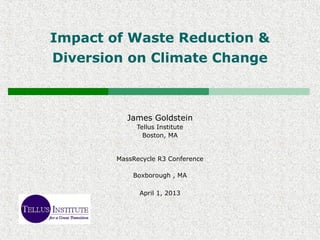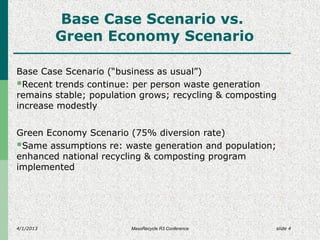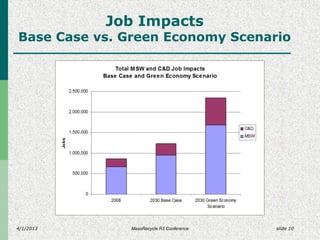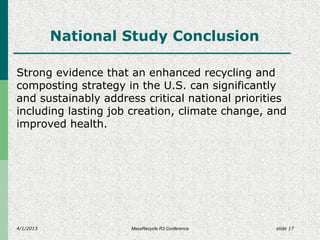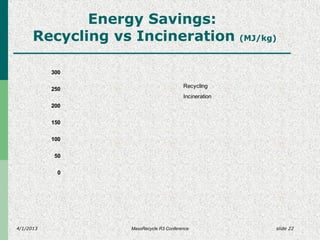Impact of Waste Reduction & Diversion on Climate Change
- 1. Impact of Waste Reduction & Diversion on Climate Change James Goldstein Tellus Institute Boston, MA MassRecycle R3 Conference Boxborough , MA April 1, 2013
- 3. 4/1/2013 slide 3MassRecycle R3 Conference Study Framework Study focused on the U.S. and includes: Municipal Solid Waste (MSW) Construction and Demolition Debris (C&D) Did not include other wastes (industrial, agricultural, sludge)
- 4. 4/1/2013 slide 4 Base Case Scenario vs. Green Economy Scenario Base Case Scenario (“business as usual”) Recent trends continue: per person waste generation remains stable; population grows; recycling & composting increase modestly Green Economy Scenario (75% diversion rate) Same assumptions re: waste generation and population; enhanced national recycling & composting program implemented MassRecycle R3 Conference
- 5. 4/1/2013 slide 5 Key Findings Achieving 75% waste diversion in 2030, in tandem with supportive policies to encourage domestic manufacturing: Creates 2.3 million jobs (1.1 million more than Base Case) Significantly lowers greenhouse gas (GHG) emissions Reduces conventional and toxic pollutants impacting human & ecological health Other benefits - reduces pressure on non-renewable resources - conserves energy - improves economic resiliency MassRecycle R3 Conference
- 6. 4/1/2013 slide 6 U.S. MSW Management 2008 MassRecycle R3 Conference U.S. MSW Management 2008 (1000 tons) 22,100 9% 135,190 54% 31,550 13% 60,770 24% Diversion Recycled Diversion Composted Disposal Landfill Disposal Incineration
- 7. 4/1/2013 slide 7 GHG, Other Pollution & Employment Drivers Size of waste stream Composition (material types/characteristics) Management practices: disposal and recycling/ composting have different labor intensities & different pollution profiles MassRecycle R3 Conference
- 8. 4/1/2013 slide 8 MSW Waste Flows 2030 Scenario Comparison MassRecycle R3 Conference
- 9. 4/1/2013 slide 9 C&D Waste Flows 2030 Scenario Comparison MassRecycle R3 Conference
- 10. 4/1/2013 slide 10 Job Impacts Base Case vs. Green Economy Scenario MassRecycle R3 Conference
- 11. 4/1/2013 slide 13 Environmental Emissions Impacts Measured life-cycle material and energy inputs and downstream outputs of wastes and pollution: - Upstream phase – resource extraction, materials refining, and product manufacturing - Use phase – product use - End-of-life phase – management of product discards MassRecycle R3 Conference
- 12. 4/1/2013 slide 14 GHG Reductions Base Case vs. Green Economy Scenario MassRecycle R3 Conference Green Economy Scenario GHG reductions equivalent to closing about 72 coal-fired power plants or taking 50 million cars off the road
- 13. 4/1/2013 slide 15 Total U.S. GHG Emissions from MSW MassRecycle R3 Conference
- 14. 4/1/2013 slide 16 Policies for Green Economy Scenario Diversion Pay As You Throw (PAYT) pricing Resource Management (RM) Contracting Materials disposal bans (e.g., C&D) Mandatory recycling/composting Enhanced container legislation Extended Producer Responsibility legislation (“product stewardship” - e.g., packaging, batteries, electronics) Domestic Manufacturing Investment tax credits for manuf. equipment using recyclables Government support for infrastructure & market development Climate change legislation MassRecycle R3 Conference
- 15. 4/1/2013 slide 17 National Study Conclusion Strong evidence that an enhanced recycling and composting strategy in the U.S. can significantly and sustainably address critical national priorities including lasting job creation, climate change, and improved health. MassRecycle R3 Conference
- 16. 4/1/2013 slide 18MassRecycle R3 Conference Tellus Study for MassDEP’s 2010 Master Plan Assessment of Materials Management Options for the Solid Waste Master Plan Review Summarized existing studies comparing lifecycle environmental and economic impacts of: - source reduction and materials reuse, recycling, and composting; - alternative technologies such as gasification, pyrolysis, and anaerobic digestion; and - disposal in municipal waste combustors and landfills. Applied study results to MA data to explore alternative future vision for materials management in terms of environmental and economic benefits. - Incorporated recommendations for how options fit together to form a cost-effective materials management system that maximizes resource and economic values of materials formerly viewed as wastes.
- 17. 4/1/2013 slide 19MassRecycle R3 Conference Life Cycle Analysis (LCA)
- 18. 4/1/2013 slide 21MassRecycle R3 Conference Energy Use: Recycled & Virgin Content Products (MJ/kg) 0 50 100 150 200 250 300 Recycled Virgin
- 19. 4/1/2013 slide 22MassRecycle R3 Conference Energy Savings: Recycling vs Incineration (MJ/kg) 0 50 100 150 200 250 300 Recycling Incineration
- 20. 4/1/2013 slide 23MassRecycle R3 Conference CO2 Emissions: Recycled &Virgin Content Products (kg eCO2/kg) 0 2 4 6 8 10 12 14 Recycled Virgin
- 21. 4/1/2013 slide 25MassRecycle R3 Conference CO2 Emissions: Composting vs Disposal (kg eCO2/kg) -12 -10 -8 -6 -4 -2 0 2 4 Yard Debris Food Scraps Paper Composting Incineration Landfill
- 22. 4/1/2013 slide 26 Study for MA DEP 2010 Master Plan Conclusions re: GHGs From a lifecycle environmental emissions perspective, source reduction, recycling and composting are the most advantageous management options for all (recyclable/compostable) materials in the waste stream. From a lifecycle net energy perspective, waste diversion provides the most benefit (3-4x incineration, gasification, pyrolysis) After maximizing diversion, appropriate to continue to monitor alternative waste management technologies. Preference among alternative technology options based on environmental performance is dependent on the relative importance placed on CO2 emissions versus other pollutants. - Modern landfills with efficient gas capture systems reduce more CO2 than other alternatives. - Landfills are worse than alternative technologies for most other pollutants. MassRecycle R3 Conference
- 23. 4/1/2013 slide 27 Questions? MassRecycle R3 Conference
Editor's Notes
- This session is about the “bigger sustainability picture,” including reducing consumption, and that’s what Tellus Institute’s work is all about. While I’m not going to focus on the consumption issue per se, Tellus has been instrumental in the establishment of the Sustainable Consumption Research and Action Initiative (SCORAI) an international network working to address challenges at the interface of material consumption, human fulfillment, lifestyle satisfaction, and technological change. One more word about the consumption issue – it’s a very deep issue that goes to the heart of our socio-economic system and our cultural values. Significantly changing our consumption patterns can have huge impacts on waste generation, GHG emissions, etc. but requires societal cultural shifts. I’m going to draw on two studies that we’ve done that have looked directly at the relationship between waste reduction or diversion and climate change. The first is a national study we completed for a coalition of labor and environmental organizations in late 2011 called More Jobs, Less Pollution: Growing the Recycling Economy in the U.S. The second is a study we completed for MA DEP as input into the previous (2010) Solid Waste Master Plan. It was called Assessment of Materials Management Options for the Solid Waste Master Plan Review. While these studies included a broad focus, both explicitly addressed the issue of waste reduction/diversion and climate change.
- As I mentioned, the first study was for a coalition of national organizations, who you can see here.
- Source: Based on “Municipal Solid Waste Generation, Recycling and Disposal in the United States: Facts and Figures for 2008,” U.S. EPA, November 2009.
- Confirms traditional solid waste management hierarchy…. Alternative technologies include gasification, pyrolysis & anaerobic digestion. Landfills reduce 2.5x as much CO2 as gasification and pyrolysis facilities and 3.5x as much as WTE incinerators.

